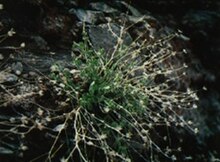Laphamia inyoensis
| Laphamia inyoensis | |
|---|---|

| |
| Scientific classification | |
| Kingdom: | Plantae |
| Clade: | Tracheophytes |
| Clade: | Angiosperms |
| Clade: | Eudicots |
| Clade: | Asterids |
| Order: | Asterales |
| Family: | Asteraceae |
| Genus: | Laphamia |
| Species: | L. inyoensis
|
| Binomial name | |
| Laphamia inyoensis Ferris (1958)
| |
| Synonyms[2] | |
|
Perityle inyoensis (Ferris) A.M.Powell (1968) | |
Laphamia inyoensis (synonym Perityle inyoensis), known by the common names Inyo rockdaisy and Inyo laphamia, is a rare species of flowering plant in the aster family.[3][4]
It is endemic to Inyo County in eastern California.
It is known from just 10 populations in the southern Inyo Mountains, at elevations of 1,800–2,710 metres (5,910–8,890 ft).[5] Its habitat is dry, rocky mountain slopes, often in limestone.[3]
Description
[edit]Laphamia inyoensis is a subshrub made up of a cluster of several hairy slender stems up to about 25 centimeters long. The hairy, glandular leaves are one or two centimeters long, oval to triangular, pointed, and toothed on the edges. They may be arranged oppositely or alternately on the stems.[3]
The inflorescence bears one to three flower heads each under a centimeter wide. The head has yellow disc florets and no ray florets.[3] The fruit is a fuzzy achene about 3 millimeters long.[3][4]
- Conservation
It is a California Native Plant Society listed Endangered species, and is threatened by proposed mining.[5]
References
[edit]- ^ "NatureServe Explorer 2.0".
- ^ Laphamia inyoensis Ferris. Plants of the World Online. Retrieved 24 June 2024.
- ^ a b c d e Jepson eFlora
- ^ a b Flora of North America
- ^ a b California Native Plant Society, Inventory of Rare and Endangered Plants (online edition, v8-02): Perityle inyoensis . accessed 20 February 2017.

